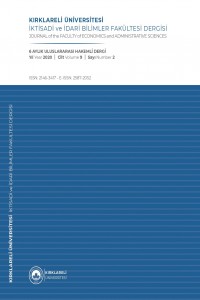Abstract
Covariance analysis is an analysis method that investigates whether there is a significant difference between the effects of the experiment and the factors that cannot be controlled with the controllable factors and the variables that cannot be controlled throughout the experiment. Linearity assumption, which is one of the most basic assumptions of covariance analysis, is an important factor affecting the representation power of the model formed as a result of covariance analysis. Using multivariate covariance analysis on nonlinear data will weaken the representation power of the model. In this study, nonlinear covariance analysis is introduced. Differences were determined by the covariance analysis which provides the assumption of linearity, and whether the data is linear or exact linear conditions affects the multivariate covariance analysis. As a result of the application, it was found that the analysis to be made on nonlinear data is more appropriate to be done by non-linear covariance analysis.
References
- Benson, K., Hartz, A.J., (2000). A comparison of observational studies and randomized controlled trials: Special articles. New England Journal of Medicine, 342, 1878–1886.
- Büyüköztürk, Ş. (1998). Kovaryans Analizi (Varyans Analizi ile Karşılaştırmalı Bir İnceleme). Ankara Üniversitesi Eğitim Bilimleri Fakültesi Dergisi. Cilt:31, Sayı:1, s:1301.
- Cantay, T. (2005). Tesadüfi Bloklar Düzeninde Kovaryans Analizi ve Uygulaması. Selçuk Üniversitesi, Fen Bilimleri Enstitüsü, Yayınlanmamış Yüksek Lisans Tezi.
- Haır J.F., Anderson R.E., Tatham R.L., Black W.C. (1995). Multivariate Data Analysis With Readings. USA: Prentice Hall Pub.
- Huitema, B.E., (1980). The Analysis of Covariance and Alternatives. New York: Wiley and Sons Pub.
- Huitema, B.E. (1985). Autocorrelation in applied behavior analysis: A myth. Behavioral Assessment, 7, 109–120.
- Huitema, B.E. (2011). The Analysis of Covariance and Alternatives. New Jersey: A. John Wiley And Sons, Inc., Publication.
- Hunka, S. (1995). Identifying regions of significance in ANCOVA problems having nonhomogeneous regressions. British Journal of Mathematical and Statistical Psychology, 48, 161–188.
- Lattin, J.M., Carroll D., Green, P. (2003). Analyzing Multivariate Data, Pacific Grove, CA : Thomson Brooks/Cole Canada.
- Şahin, H. (2006). Kovaryans Analizi ve Bir Uygulama. Gazi Üniversitesi, Fen Bilimleri Enstitüsü, Yayınlanmamış Yüksek Lisans Tezi.
- Şenoğlu, B., Acıtaş, Ş. (2011). İstatistiksel Deney Tasarımı, Ankara: Nobel Yayınları (2. Basım).
- Weber, D.C., Skillings, J.H. (2000). A First Course in The Design of Experiments: A Linear Models Approach. New York: Crc Press Llc.
Abstract
Kovaryans analizi deneme etkileri arasında anlamlı bir farklılık olup olmadığını araştıran, kontrol edilebilen faktörlerle deney boyunca kontrol edilemeyen ortak değişken veya değişkenleri de modelde birlikte değerlendirilen bir analiz yöntemidir. Kovaryans analizinin en temel varsayımlarından biri olan doğrusallık varsayımı, kovaryans analizi sonucunda oluşturulan modelin temsil gücünü etkileyen önemli bir etkendir. Doğrusal olmayan veriler üzerinde çok değişkenli kovaryans analizinin kullanılması, modelin temsil gücünü zayıflatacaktır. Bu çalışmada, doğrusal olmayan kovaryans analizi tanıtılmış, doğrusallık varsayımını sağlayan kovaryans analizi ile farklılıkları ortaya konmuş ve yapılan uygulama ile verinin doğrusal olup olmaması veya tam doğrusal durumlarının çok değişkenli kovaryans analizini nasıl etkilediği incelenmiştir.
References
- Benson, K., Hartz, A.J., (2000). A comparison of observational studies and randomized controlled trials: Special articles. New England Journal of Medicine, 342, 1878–1886.
- Büyüköztürk, Ş. (1998). Kovaryans Analizi (Varyans Analizi ile Karşılaştırmalı Bir İnceleme). Ankara Üniversitesi Eğitim Bilimleri Fakültesi Dergisi. Cilt:31, Sayı:1, s:1301.
- Cantay, T. (2005). Tesadüfi Bloklar Düzeninde Kovaryans Analizi ve Uygulaması. Selçuk Üniversitesi, Fen Bilimleri Enstitüsü, Yayınlanmamış Yüksek Lisans Tezi.
- Haır J.F., Anderson R.E., Tatham R.L., Black W.C. (1995). Multivariate Data Analysis With Readings. USA: Prentice Hall Pub.
- Huitema, B.E., (1980). The Analysis of Covariance and Alternatives. New York: Wiley and Sons Pub.
- Huitema, B.E. (1985). Autocorrelation in applied behavior analysis: A myth. Behavioral Assessment, 7, 109–120.
- Huitema, B.E. (2011). The Analysis of Covariance and Alternatives. New Jersey: A. John Wiley And Sons, Inc., Publication.
- Hunka, S. (1995). Identifying regions of significance in ANCOVA problems having nonhomogeneous regressions. British Journal of Mathematical and Statistical Psychology, 48, 161–188.
- Lattin, J.M., Carroll D., Green, P. (2003). Analyzing Multivariate Data, Pacific Grove, CA : Thomson Brooks/Cole Canada.
- Şahin, H. (2006). Kovaryans Analizi ve Bir Uygulama. Gazi Üniversitesi, Fen Bilimleri Enstitüsü, Yayınlanmamış Yüksek Lisans Tezi.
- Şenoğlu, B., Acıtaş, Ş. (2011). İstatistiksel Deney Tasarımı, Ankara: Nobel Yayınları (2. Basım).
- Weber, D.C., Skillings, J.H. (2000). A First Course in The Design of Experiments: A Linear Models Approach. New York: Crc Press Llc.
Details
| Primary Language | Turkish |
|---|---|
| Journal Section | Research Article |
| Authors | |
| Publication Date | September 30, 2020 |
| Published in Issue | Year 2020 Volume: 9 Issue: 2 |

